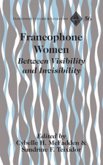Although the storytelling of any time rewrites itself, rewriting became a primary concern in the literature of the twentieth century, an era characterized as having quoted, reenacted, cannibalized, revised, redone, refurbished, and outright plagiarized the texts of earlier times. The modern obsession with literary reiteration manifests itself in a rather unique way in the narratives of Marguerite Duras, Annie Ernaux, and Marie Redonnet. These authors systematically and repeatedly rewrite their own texts, and in so doing, give evidence of three of the more salient aspects of twentieth-century French literature: a trend toward the representation of multifaceted selves, a desire to reevaluate the literary paradigm, and an acute concern for the unreliability of language. This book argues that the rewriting performed by Duras, Ernaux, and Redonnet moves beyond the tacit rewriting that occurs in any text toward a renovation of various features of the literary arena within which they circulate. Cathy Jellenik argues that all writing contains rewriting - an argument grounded in the theoretical apparatuses of Saussure, Bakhtin, Benveniste, Barthes, Kristeva, and Derrida. She then examines and interrogates the ways in which Duras, Ernaux, and Redonnet use rewriting to question and rethink the literary traditions they inherit. Jellenik suggests that the rewriting projects of Duras, Ernaux, and Redonnet promise to lead them, and their readers, toward the creation of a new literary aesthetic capable of responding to the questions of our times.
«In 'Rewriting rewriting: Marguerite Duras, Annie Ernaux, and Marie Redonnet', Cathy Jellenik offers both a theoretical reflection on the difficult issue of rewriting and a more practical investigation of the specific shapes that gesture assumes in the work of three major French women authors. Among the many interesting points that Ms. Jellenik raises, three seem to me to be most welcome indeed: first, the efforts of these writers to postulate a new kind of language suited to their expressive needs; second, the manner in which they come to terms with the burden of literary tradition, turning it to their own uses; finally, the techniques they deploy in order to put the self on stage, reconfiguring it strategically as their work evolves. This ambitious book is an important statement for contemporary French studies.» (Warren Motte, Professor of French and Comparative Literature, University of Colorado)








